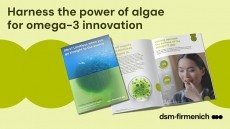DHA supplements remedy cholesterol levels in children
restore normal blood vessel function in children with inherited
high cholesterol, report researchers.
The small trial is one of the first to suggest that supplementing with the omega-3 fatty acid may improve the health of children at risk of early heart disease.
Childhood cholesterol levels were not well-established until fairly recently but experts now believe that high cholesterol in children may be common. Recent UK research revealed that 20 per cent of a group of 11-14 year olds were already experiencing deterioration in their micro-vascular health.
This raises a child's chances of having high cholesterol levels in adulthood, the single biggest modifiable risk factor for coronary heart disease. However it is not known whether cholesterol-lowering medications are safe for use in children so treatment usually begins with dietary changes and exercise.
Previous research has demonstrated that both fish oil and DHA supplements improve blood vessel function in adults so researchers funded by the US National Institutes of Health recruited 20 children aged between nine and 19-years-old with inherited high cholesterol for a double-blind study.
The children received nutritional counselling based on national guidelines on cholesterol-lowering and healthy diet for six weeks. They were then randomly assigned to receive either a 1.2g DHA supplement, provided by Martek, or a placebo daily for six weeks, followed by a washout phase of six weeks and crossover phase of six weeks. They continued the advised diet.
After the DHA supplementation, the children's blood vessel function was restored to the levels of healthy children, say the authors in the December 2004 issue of The International Journal of Clinical Pharmacology and Therapeutics (vol 42, pp 672-679).
Endothelium-dependent flow-mediated dilation (FMD), a marker of blood vessel function, increased significantly after DHA supplementation compared to baseline, diet alone or placebo, write the researchers from the University of California, San Francisco.
"We found no improvement in FMD with the diet alone consistent with our recent investigation," note the authors.
They believe that DHA may improve NO synthesis or release, previously observed in a study of EPA on endothelial cells and in human volunteers after fish oil supplements.
"DHA has the potential to delay early coronary artheriosclerosis in hyperlipidemic children," they conclude.












